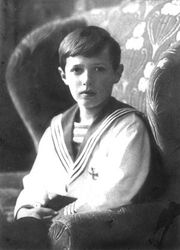Tsarevich Alexei Nikolaevich of Russia
Tsesarevich Alexei Nikolaevich (Russian: Цесаревич Алексей Николаевич) (July 30 (OS)/August 12 (NS), 1904 – July 17, 1918), of the House of Romanov, was Tsesarevich of Russia and was the youngest child of Tsar Nicholas II of Russia and Alexandra Fyodorovna. Also called Alyosha (Алёша) and Lyoshka (Лёшка) affectionately.
Life account
Alexei was born on 30 July 1904 in Peterhof to the Emperor and Empress of Russia, Nicholas II and Alexandra Fedorovna. He was a great-grandson of Queen Victoria of England. He was the youngest of five children, and the only boy. His older sisters were the Grand Duchesses Olga, Tatiana, Maria and Anastasia. Of all his sisters, Alexei was reportedly closest to Anastasia.
Alexei was christened at Peterhof on 24 August 1904. His godparents were The King of England, The King of Denmark, The Grand Duke of Hesse, The Prince of Wales, Wilhelm II of Germany, Grand Duke Alexei Alexandrovich of Russia, Grand Duke Michael Nicolaievich of Russia, The Dowager Empress of Russia, Princess Victoria of Great Britain, Grand Duchess Alexandra Iosifovna of Russia, and Grand Duchess Olga Nikolaevna of Russia.
He inherited haemophilia from his mother Alexandra, a condition which could be traced back to her maternal grandmother Queen Victoria. His haemophilia led to controversy, on the grounds that it was believed that his mother was having an affair with Russian Starets, Grigori Rasputin. Rasputin was claimed to be able to 'heal' Alexei when he was on the brink of death after spells of illness caused by his blood illness.
He was a month shy of his fourteenth birthday when he was executed on July 17, 1918 in the cellar room of the Ipatiev House in Yekaterinburg. The execution was carried out by forces of the Bolshevik secret police under Yakov Yurovsky. When the bodies were located, that of Alexei was missing, along with that of one his sisters (generally thought to be Maria). Due to his lifelong hemophilia, including a recent attack which had left him unable to walk, it is extremely unlikely that he escaped. The missing bodies are thought to have been cremated.
In 2000, Alexei and his family were canonized by the Russian Orthodox Church. They are considered "passion bearers", a reference to their exemplary behavior in the face of hardship and death.
Historical significance
Alexei was the heir to the Romanov Empire. Paul I had passed laws forbidding women to succeed to the throne, possibly in revenge for what he considered the immoral behavior of his mother, Catherine II ('the Great'). Alexei was named after Alexis I of Russia, who ruled from 1645 to 1676, known as 'the Quiet' and father of Peter the Great.
In the first draft of Tsar Nicholas II's 1917 abdication, the intention was that the twelve-year-old Alexei would ascend to the throne under a regency. However, due to Nicholas' wish that Alexei should not be separated from the family, and in view of his crippling illness, the final draft included the abdication both of father and son in favour of Nicholas' younger brother Grand Duke Michael Alexandrovich of Russia, which Michael was unwilling to accept.
Alexei's haemophilia was integral to the rise of Grigori Rasputin. One of the many things Rasputin did that unintentionally facilitated the fall of the Romanovs was to tell the Tsar that the war would be won once he (Tsar Nicholas II) took command of the Russian Army. Following this advice was a serious mistake as the Tsar had no military experience. The tsaritsa, Empress Alexandra, a deeply religious woman, came to rely upon Grigori Rasputin and believe in his ability to help Alexei where conventional doctors had failed. This theme is explored in Robert K. Massie's "Nicholas and Alexandra". It is not too far-fetched to see that if Alexei had not suffered so terribly, Rasputin could never have gained such influence over Russian politics during the World War I, which at the very least hastened the collapse of Romanov rule.
Caring for Alexei seriously diverted the attention of his father, Nicholas II, and the rest of the Romanovs from the business of war and government, which may have further compromised their control of the state and contributed to the Russian Revolution.
